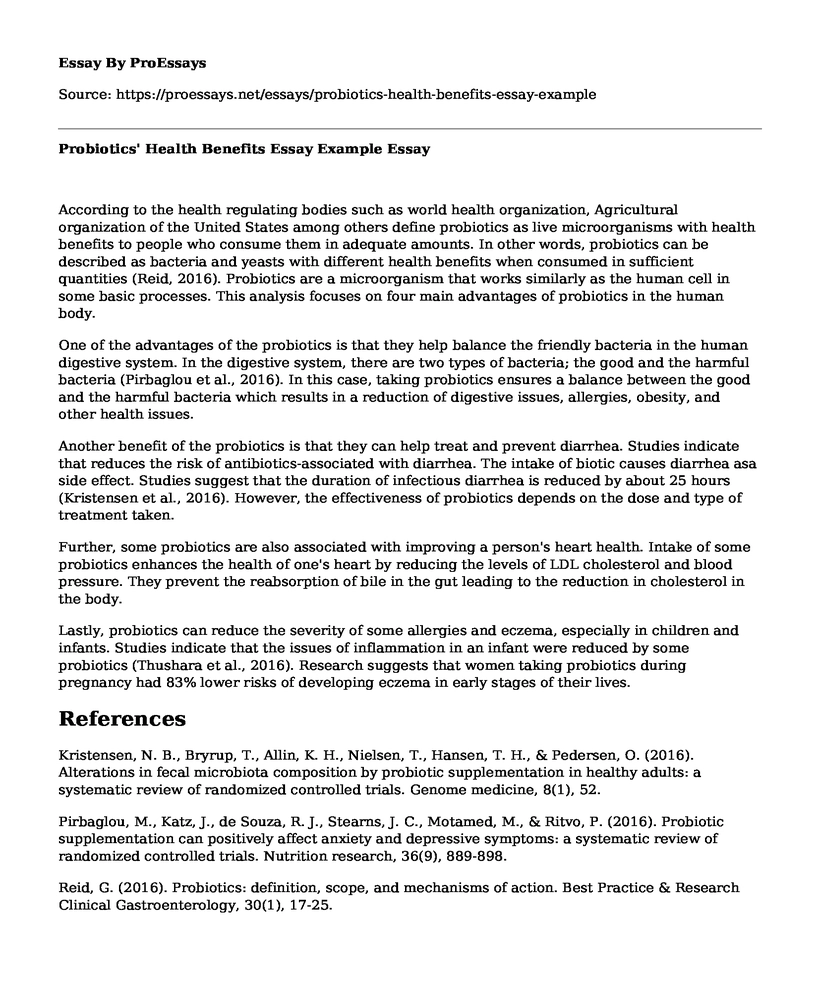According to the health regulating bodies such as world health organization, Agricultural organization of the United States among others define probiotics as live microorganisms with health benefits to people who consume them in adequate amounts. In other words, probiotics can be described as bacteria and yeasts with different health benefits when consumed in sufficient quantities (Reid, 2016). Probiotics are a microorganism that works similarly as the human cell in some basic processes. This analysis focuses on four main advantages of probiotics in the human body.
One of the advantages of the probiotics is that they help balance the friendly bacteria in the human digestive system. In the digestive system, there are two types of bacteria; the good and the harmful bacteria (Pirbaglou et al., 2016). In this case, taking probiotics ensures a balance between the good and the harmful bacteria which results in a reduction of digestive issues, allergies, obesity, and other health issues.
Another benefit of the probiotics is that they can help treat and prevent diarrhea. Studies indicate that reduces the risk of antibiotics-associated with diarrhea. The intake of biotic causes diarrhea asa side effect. Studies suggest that the duration of infectious diarrhea is reduced by about 25 hours (Kristensen et al., 2016). However, the effectiveness of probiotics depends on the dose and type of treatment taken.
Further, some probiotics are also associated with improving a person's heart health. Intake of some probiotics enhances the health of one's heart by reducing the levels of LDL cholesterol and blood pressure. They prevent the reabsorption of bile in the gut leading to the reduction in cholesterol in the body.
Lastly, probiotics can reduce the severity of some allergies and eczema, especially in children and infants. Studies indicate that the issues of inflammation in an infant were reduced by some probiotics (Thushara et al., 2016). Research suggests that women taking probiotics during pregnancy had 83% lower risks of developing eczema in early stages of their lives.
References
Kristensen, N. B., Bryrup, T., Allin, K. H., Nielsen, T., Hansen, T. H., & Pedersen, O. (2016). Alterations in fecal microbiota composition by probiotic supplementation in healthy adults: a systematic review of randomized controlled trials. Genome medicine, 8(1), 52.
Pirbaglou, M., Katz, J., de Souza, R. J., Stearns, J. C., Motamed, M., & Ritvo, P. (2016). Probiotic supplementation can positively affect anxiety and depressive symptoms: a systematic review of randomized controlled trials. Nutrition research, 36(9), 889-898.
Reid, G. (2016). Probiotics: definition, scope, and mechanisms of action. Best Practice & Research Clinical Gastroenterology, 30(1), 17-25.
Sanchez, B., Delgado, S., BlancoMiguez, A., Lourenco, A., Gueimonde, M., & Margolles, A. (2017). Probiotics, gut microbiota, and their influence on host health and disease. Molecular nutrition & food research, 61(1), 1600240.
Thushara, R. M., Gangadaran, S., Solati, Z., & Moghadasian, M. H. (2016). Cardiovascular benefits of probiotics: a review of experimental and clinical studies. Food & Function, 7(2), 632-642.
Cite this page
Probiotics' Health Benefits Essay Example. (2022, Dec 10). Retrieved from https://proessays.net/essays/probiotics-health-benefits-essay-example
If you are the original author of this essay and no longer wish to have it published on the ProEssays website, please click below to request its removal:
- Causes and Effects of Anterograde Amnesia Essay
- Coffee Hidden Meaning Essay Example
- Essay on Understanding Georgia's Poor Health Status: Key Indicators & Impact
- Research Paper on Living With COPD: Making the Most of Your Life
- Abortion: A Controversial Issue in US Politics - Essay Sample
- Covid-19: HR Challenges in Business Productivity Amidst Job Losses - Essay Sample
- Free Essay Example on Improve Your Nursing Practice with Evidence-Based Practices







